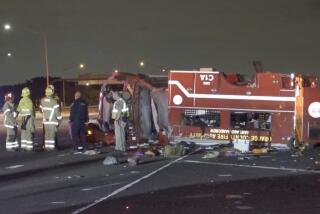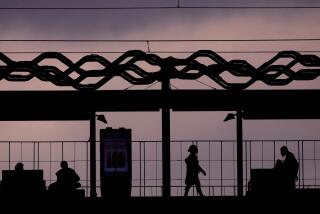Santa Ana Mayor Was Invisible Man
Amid a sea of 10,000 immigrants marching in possibly the largest protest in Santa Ana’s history, one of the city’s more prominent immigrants was noticeably absent: longtime Mayor Miguel Pulido.
Los Angeles Mayor Antonio Villaraigosa spoke to demonstrators Monday along Wilshire Boulevard, addressed previous downtown rallies and told protesting students he supported their goals but implored them not to skip school. But the Santa Ana mayor has been mostly mum.
A native of Mexico City and a naturalized U.S. citizen, Pulido, 50, has been largely silent on the immigration issues that have preoccupied the nation this spring. Monday was no exception.
The five-term mayor was not seen marching with residents as Orange County Supervisor Lou Correa was. He was not seen speaking from a dais in downtown Santa Ana, as council member Jose Solorio was. He did attend a council meeting Monday night.
The mayor declined to be interviewed Tuesday, but issued a statement: “Throughout the day, I was in constant communication with our city manager and with our police chief to ensure that our priority was the safety of the demonstrators as well as all of our residents.
“At the Santa Ana City Council meeting later that evening, I thanked the demonstrators for their peaceful protest and for their cooperation with the city.”
The mayor’s stance on immigration puzzles some activists. “You do have to ask why,” said Amin David, who heads Los Amigos of Orange County, a Latino advocacy group. David was present Monday.
“This was an important day for immigrants and all who respect immigrants. And this is a mayor who can’t be found. Actually, he is conspicuously absent at most public events,” he said. “We don’t even get outraged by it anymore. We are used to it.”
The mayor does not speak up on immigration issues, even though 53% of the city’s population is foreign-born and 77% speak Spanish, Santa Ana Unified School District board member John Palacio said.
Pulido “has never really been visible. He has never taken up issues in our community. Why would this be any different?” he said.
The mayor’s supporters had no problem with his absence Monday. “Given that the protest was pointed at the federal government, I don’t know if the mayor has to be present,” said Paul Giles, president of the French Park Neighborhood Assn. “If I were mayor, I would love to go to all those events. I love that stuff. But I don’t have an issue with someone who does his job and nothing else.”
Solorio agreed: “We all have our own priorities and issue areas that we work on.”
Political analysts say it may not matter whether the mayor appeared or not. Many of the protesters are not citizens who can vote.
An estimated 49.3% of city voters are Latinos, but only 42% of voters turned out in 2005, 37% in 2004 and 32% in 2002, according to analyst Steve Sammarco, vice president of AMAC Information and Graphics in Redondo Beach.
Pulido first campaigned among these voters in 1986 after making a name fighting the city’s efforts to condemn his father’s Main Street muffler shop. Eight years later, he was mayor.
In a 2004 interview, the mayor said he had not always imagined a life as a politician. He emigrated from Mexico City as a 5-year-old, graduated from Cal State Fullerton in 1980 and worked as a mechanical engineer for several years.
Pulido told The Times that his family income came mostly from exporting catalytic converters to Mexico through his company, Sol Distributing International. He has also been involved in several real estate transactions.
He is a part-time mayor. On Monday, he showed up about 15 minutes late for the regularly scheduled 5:30 p.m. council meeting. The meeting was not canceled, even as block after block of businesses closed in the city to honor what was described as a boycott to support immigrants’ contributions to the U.S. economy.
On Monday, the Pulido family business, Ace Muffler on 1st Street, was open, according to someone who answered the phone Tuesday.
Mike Gonzalez, a protest organizer and member of the Coalition of Mexican Organizations in Orange County, said the mayor told his group that he would speak, but didn’t show up.
Jack Pitney, professor of government at Claremont McKenna College, said some elected officials were able to garner votes without making as many public appearances as others.
“You can only meet a small fraction of the electorate anyway,” he said.
Besides, many politicians shied from the protests because they thought the events could become violent, Pitney said.
Sammarco said most Latinos in Santa Ana didn’t vote, so the mayor’s no-show might have little political impact.
The mayor is “a savvy politician who knows voter turnout is influenced by voter education and income,” he said. “It doesn’t necessarily matter if you show up at a protest.”
More to Read
Sign up for Essential California
The most important California stories and recommendations in your inbox every morning.
You may occasionally receive promotional content from the Los Angeles Times.










